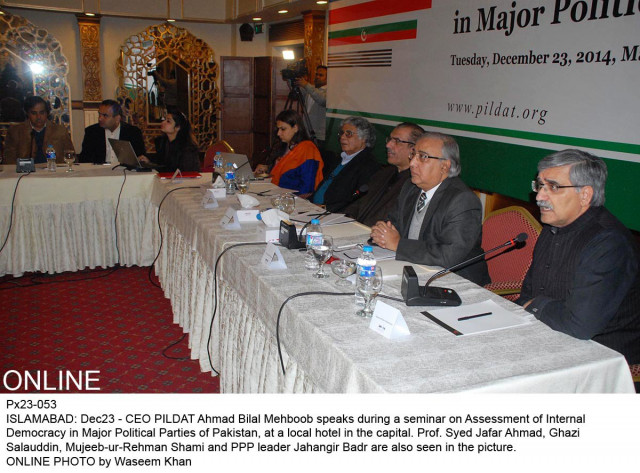Scorecard: Internal democracy weak in major political parties, says report
PTI the most, PML-N the least democratic

A report, compiled by the Pakistan Institute of Legislative Development And Transparency (Pildat), found that level of internal democracy was weak in the political parties even though their constitutions were fairly democratic. The findings of the report, titled “Assessing internal democracy of major political parties of Pakistan” were shared at a local hotel here on Tuesday.
Speakers including academics and journalists emphasised on the need for more democracy in decision-making in political parties and improvement in the reporting on their financial accounts.
The report’s focus on the transparency in funding sources revealed that in the absence of a formal and institutionalised system, political parties remained dependent on the personal fortunes of their main leaders.
Speaking on the occasion, Dr Jaffar Ahmed, Director, Pakistan Study Centre at the University of Karachi said there was no transparency in the funding and accounts of many parties. Daily Pakistan Editor-in-Chief Mujibur Rehman Shami, who also served as a member of the steering committee in-charge of preparing the report, said that sources were unknown and there was almost no information about funds.
“Many of the parties have no record of membership and few [even] have no record of their council members,” he said.
Shami said that proper record submission with the Election Commission of Pakistan (ECP) could help put an end to formation of splinter groups within the parties.
The report assessing internal democracy of the selected eight political parties gave Jamaat-i-Islami (JI) a score of 56 per cent, PTI 49 per cent, Awami National Party (ANP) 46 per cent, Jamiat Ulema-i-Islam-Fazl (JUI-F) 43 per cent, National Party (NP) 43 per cent, Muttahida Qaumi Movement (MQM) 42 per cent, Pakistan People’s Party (PPP) 34 per cent and PML-N a score of 32 per cent.
Even though JI has been given the highest score, it has been disregarded and not compared with the other seven parties because of its unique and somewhat restricted system of membership, candidature for internal election and campaign rules for party office.
Lack of regular party election, inability to hold regular meetings of main party bodies and committees, visible trends of dynastic party leadership and no change in top party leadership for many years seem to be the factors, which have adversely affected the democratic credentials of the PML-N.
Almost identical factors have affected PPP score.
Open and keenly contested party election at all levels in 2012-2013 and regular core committee meetings have apparently helped PTI rated the most democratic party.
“The (holding of intra-party) elections will not benefit PTI because many of its leaders have joined it after switching several parties,” said PPP’s Jahangir Badar who was present at the event.
In order to prepare the report, a framework consisting of multiple indicators was devised by a broad-based steering committee constituted by Pildat.
The report gave an overall score of 43 per cent on state of democracy within the parties, credibility of parties’ statements of accounts and their funding base a 35 per cent, intra-party democratic guarantees within the constitutions 54 per cent, regularity of parliamentary party meetings 53 per cent, active participation of women, youth and minorities in party affairs 52 per cent, internal party elections 49 per cent and discouraging practice of dynastic leadership 45 per cent.
Columnist Ghazi Salahuddin and Pildat President Ahmed Bilal Mehboob Ahmed also spoke.

Published in The Express Tribune, December 24th, 2014.



















COMMENTS
Comments are moderated and generally will be posted if they are on-topic and not abusive.
For more information, please see our Comments FAQ